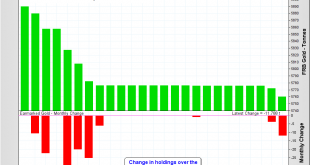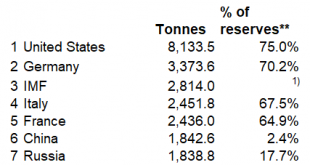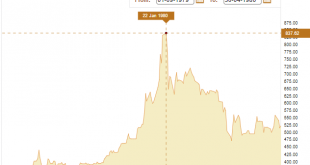On 17 April, Turkish news publication Ahval published a report stating that during 2017, Turkey withdrew 26.8 tonnes of gold that it had stored in the vaults of the New York Federal Reserve, and moved this gold under the custodianship of the Bank of England and the Bank for International Settlements (BIS). The source of the Ahval report was a Turkish language article from the popular Hürriyet newspaper in Turkey....
Read More »Central Banks Care about the Gold Price – Enough to Manipulate it!
In early March, RT.com, the Russian based media network, asked me for comments and opinion on the subject of central bank manipulation of gold prices. The comments and opinion that I supplied to RT became the article that RT then exclusively published on its website on 18 March under the title “Central banks manipulating & suppressing gold prices – industry expert to RT“. This article is now transcribed below, here...
Read More »Why the World’s Central Banks hold Gold – In their Own Words
Collectively, the central bank sector claims to hold the world’s largest above ground gold bar stockpile, some 33,800 tonnes of gold bars. Individually within this group, some central banks claim to be the top holders of gold bullion in the world, with individual holdings in the thousands of tonnes range. This worldwide central bank group, also known as the official sector, spans central banks (such as the Deutsche...
Read More »Tax Evasion and Tax Rates
High rates of tax evasion are not necessarily a consequence of high tax rates. In an NBER working paper, Annette Alstadsæter, Niels Johannesen, and Gabriel Zucman provide estimates of countries’ wealth holdings in “tax havens.” Based on BIS statistics the authors find that: Wealth on the order of 10% of global GDP is held offshore. In Scandinavia, the number is much smaller. In continental Europe, it equals roughly 15%. In some Gulf and Latin American countries, almost 60%. In Russia, the...
Read More »New Gold Pool at the BIS Switzerland: A Who’s Who of Central Bankers
This is an extract and summary from “New Gold Pool at the BIS Basle, Switzerland: Part 1” which was first published on the BullionStar.com website in mid-May. Part 2 of the series titled “New Gold Pool at the BIS Basle: Part 2 – Pool vs Gold for Oil” is also posted now on the BullionStar.com website. “In the Governor’s absence I attended the meeting in Zijlstra’s room in the BIS on the afternoon of Monday,...
Read More »New Gold Pool at the BIS Basle: Part 2 – Pool vs Gold for Oil
This is Part 2 of a two-part series. The series focuses on collusive discussions and meetings that took place between the world’s most powerful central bankers in late 1979 and 1980 in an attempt to launch a central bank Gold Pool cartel to manipulate and control the free market price of gold. The meetings centered around the Bank for International Settlements (BIS) in Basle, Switzerland. Part 2 takes up where Part 1...
Read More »New Gold Pool at the BIS Basle, Switzerland: Part 1
“In the Governor’s absence I attended the meeting in Zijlstra’s room in the BIS on the afternoon of Monday, 10th December to continue discussions about a possible gold pool. Emminger, de la Geniere, de Strycker, Leutwiler, Larre and Pohl were present.” 13 December 1979 – Kit McMahon to Gordon Richardson, Bank of England Introduction A central bank Gold Pool which many people will be familiar with operated in the...
Read More »BIS Research Review
In an Independent Review of BIS Research, Franklin Allen, Charles Bean and José De Gregorio conclude that … BIS research clearly ‘punches above its weight’ compared to its central bank peers. Finally, the relative performance of the BIS has clearly improved over the past five years, a tribute to the influence of the previous (Steve Cecchetti) and current (Claudio Borio and Hyun Shin) leadership … They recommend, among other points: The research programme should have a more clearly defined...
Read More » Swiss Economicblogs.org
Swiss Economicblogs.org






